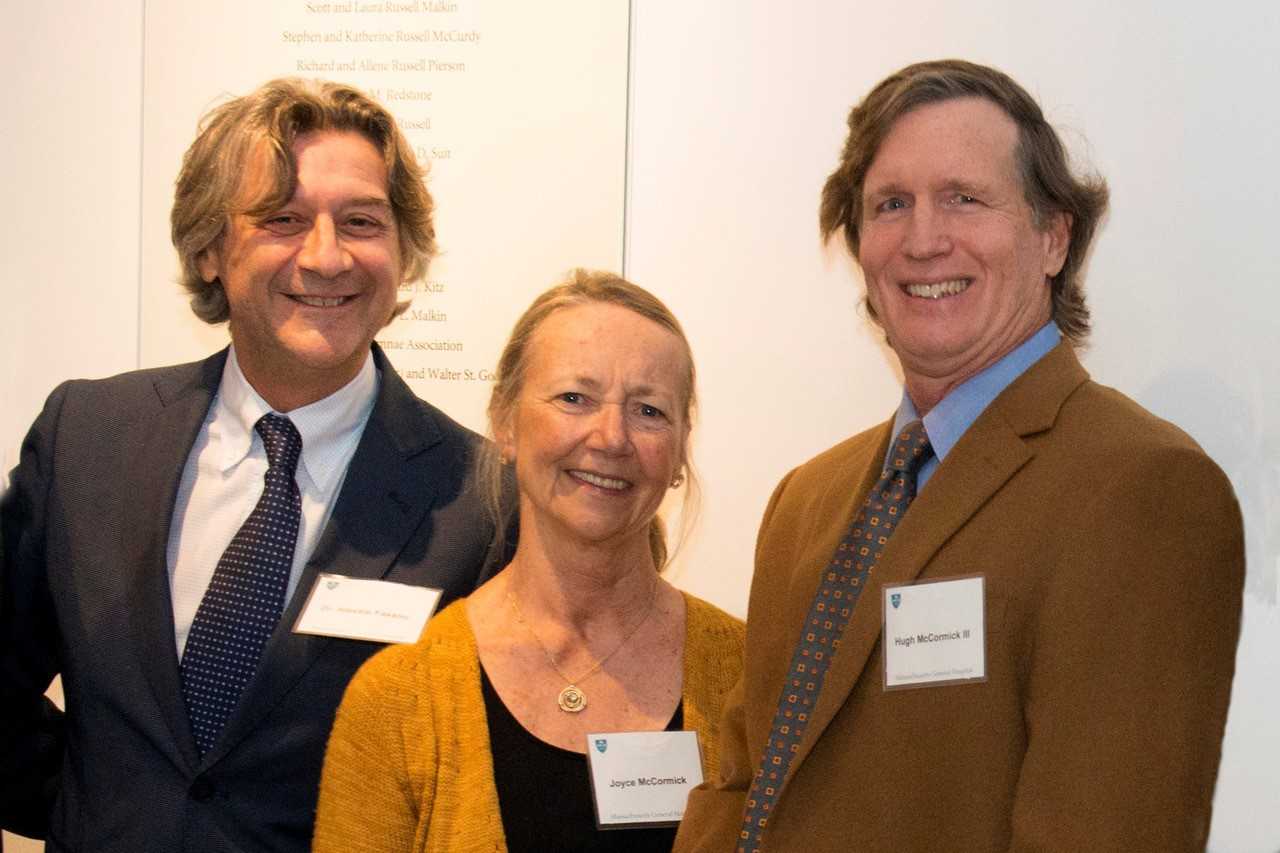 Long plagued by unexplained symptoms, Joyce McCormick felt relieved to finally be diagnosed with celiac disease more than 20 years ago. She and her husband, Hugh McCormick III, became advocates for celiac disease research, recently making a $1 million gift to the Center for Celiac Research and Treatment at MassGeneral Hospital for Children.
Long plagued by unexplained symptoms, Joyce McCormick felt relieved to finally be diagnosed with celiac disease more than 20 years ago. She and her husband, Hugh McCormick III, became advocates for celiac disease research, recently making a $1 million gift to the Center for Celiac Research and Treatment at MassGeneral Hospital for Children.
Led by the forward-thinking clinician and researcher, Alessio Fasano, MD, the center treats patients and conducts research on celiac disease, a disorder of the immune system triggered by exposure to gluten, a protein found in some foods.
The Celiac Disease Mystery
Dr. Fasano and researchers at the center seek to solve the decades-old mystery of celiac disease: Why do some members of a family get it while others don’t, despite similar genes and exposure to gluten? About 1 in 133 people have the disease.
The McCormick gift will fuel the kind of innovative research that would otherwise go unsupported by traditional funding agencies.
The McCormick gift will fuel the kind of innovative research that would otherwise go unsupported by traditional funding agencies such as a long-term study of infants born into families with celiac disease.
“We are actually on the verge of really important discoveries,” says Joyce who, with Hugh, serves on the center’s advisory board. Dr. Fasano points to the infant study as a one-of-a kind effort to collect evidence to help explain celiac disease and related disorders. The research, he says, may also help people with similar autoimmune diseases such as diabetes.
A Mother’s Search for Relief
Joyce was pregnant for the first time in 1987 when she began having frequent abdominal pain and diarrhea. Her doctors could not identify the problem. She had a miscarriage — a problem now known to be related to celiac disease. Two more miscarriages followed before she successfully gave birth to two sons. Six more miscarriages followed. All the while, her debilitating symptoms continued, and her life became a search for relief.
The day she found herself waylaid in a grimy public restroom in Central Park with her two small boys, was a turning point. “I have to find out what this is!” she vowed.
It wasn’t until around 1995 that her new internist near her home in Maryland diagnosed her with celiac disease. The diagnosis was a welcome revelation. Around the same time, she and her husband learned of the important work of Dr. Fasano. They heard him speak at a support group meeting and were impressed by his commitment to research.

Deeply Felt Support
They learned that he had made several important discoveries about the disease including the fact that, while celiac was widely diagnosed in Europe, it went largely unrecognized in the United States.
The McCormick family’s support for Dr. Fasano’s work has been deeply felt. Joyce and Hugh have been regular donors, participating in walk-a-thons and other fundraisers. Hugh McCormick, Jr., Hugh’s late father, gave a generous gift of $100,000 in the early 2000s. Together, the McCormicks, Dr. Fasano and their community of friends, family and supporters spread the word about the need for research to find better ways to treat and prevent the disease.
Much has changed since Joyce was first diagnosed. Dr. Fasano has helped people understand that celiac disease often occurs for the first time in adulthood. Gluten-free foods are now widely available. But the cause remains a mystery.
Targeting the Microbiome
“Our target is the microbiome,” says Dr. Fasano explaining that the microbiome is the vast population of microbes, such as bacteria, fungus and viruses, that live in and on humans. When the microbiome is out of balance, disease can result.
To understand how changes in the microbiome contribute to celiac disease, Dr. Fasano and the center have launched a study of infants called the Celiac Disease Genomic Environmental Microbiome and Metabolomic Study (CDGEMM).
“We’re in the same boat,” Dr. Fasano says, “and we’ve been rowing in the same direction together for 20 years.”
By studying these infants, each of whom have a close family relative who has the disease, researchers hope to answer the questions that have haunted Joyce McCormick for decades.
Hope for Everyday Control
“My greatest hope is that finding the cause of celiac disease might lead to more predictability in controlling celiac disease in everyday life,” Joyce says. She points out that symptoms can occur at anytime, even when people are vigilant about maintaining a gluten-free diet. “The constant anxiety of whether symptoms will occur in public can interfere with one’s life,” she says.
Joyce also seeks to know why she has celiac disease while her siblings do not and whether her children or grandchildren are at risk.
For his part, Dr. Fasano, sees his partnership with the McCormicks as the continuation of a 20-year journey that will lead to answers to such questions. “We’re in the same boat,” he says, “and we’ve been rowing in the same direction together for 20 years.”
For more information about how you can support the Center for Celiac Research and Treatment, please contact us.

